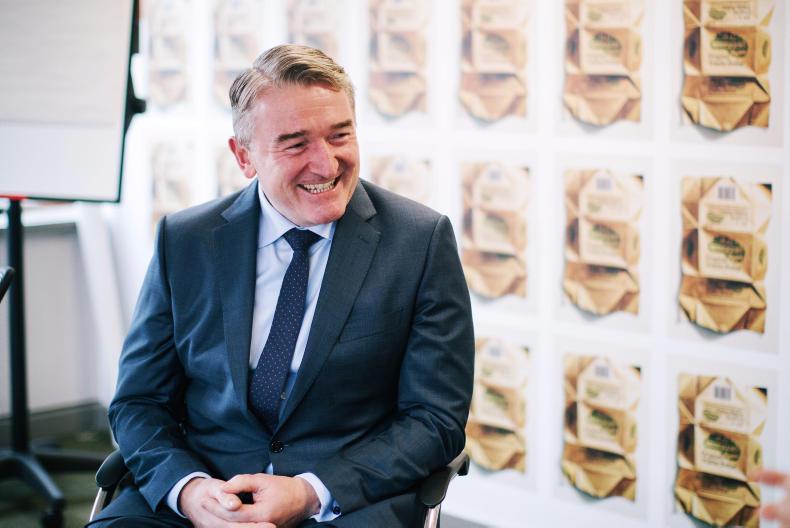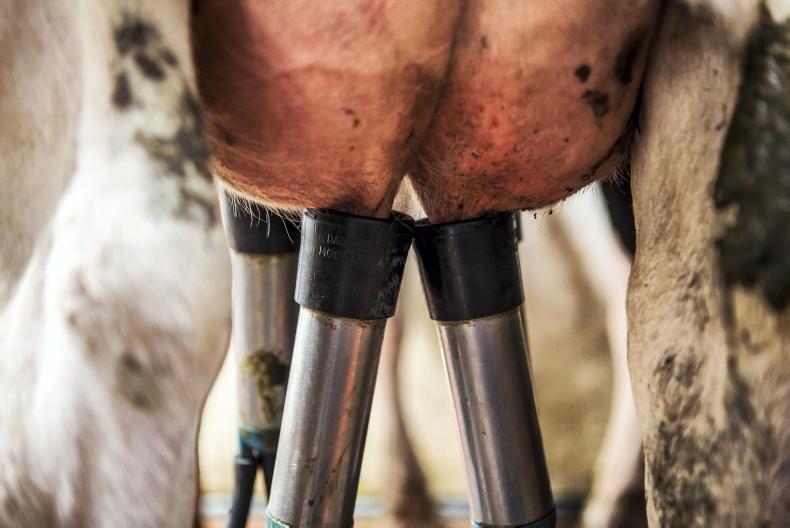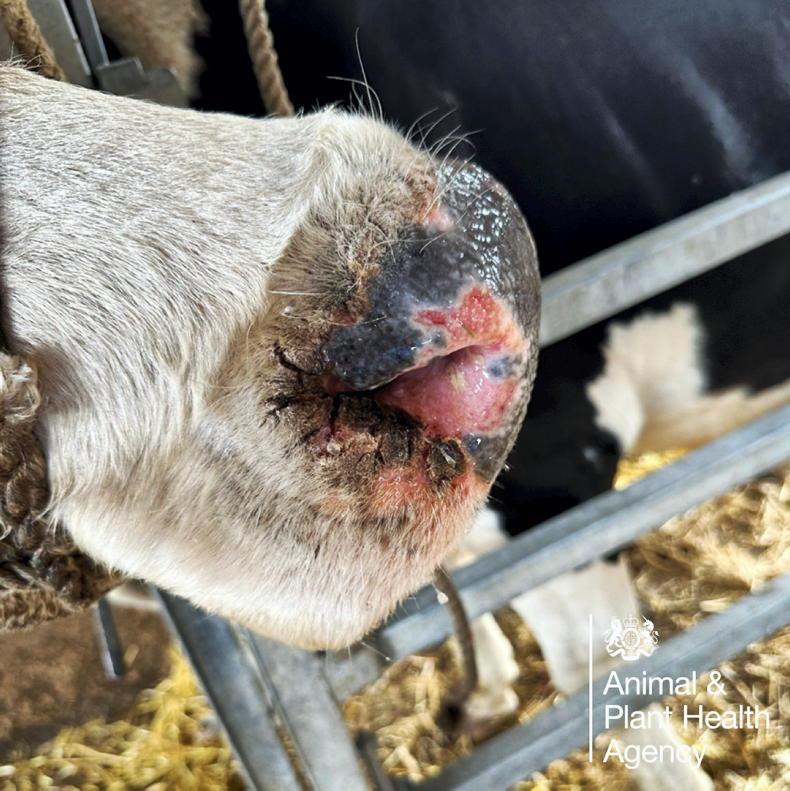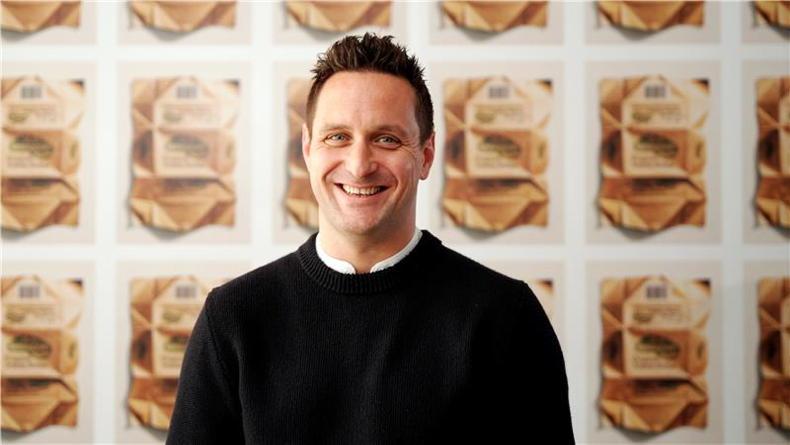Looking out of Ornua’s newly refurbished headquarters on Grattan Street, the dozens of cranes and half-completed towers across the skyline confirm that Dublin is once again back and also booming.
Inside, it is a similar story as new Ornua CEO John Jordan explains that dairy fats are back and butter prices are booming. Throw in the growth in national milk output of almost 50% in the last five years and it is clear that Jordan is excited about the future of dairy.
Of course he is not new to Ornua, having joined the business 25 years ago through its graduate recruitment programme.
Jordan’s first big leadership role came when he took on the opportunity to run Ornua’s US distribution business, DPI. It was a business that had grown to a $1bn revenue business with 1,000 employees but became loss-making.
Jordan was asked to go over and fix it, with a strategy to sell,once it became profitable again. He is largely credited for turning this business around, facilitating the sale of an easy percentage stake in the business, which generated a bonus of €13m for Ornua’s members .
“Up to this point I had never really run a business” he says and it galvanised two things for him. Firstly he explains that having the right people is key to running a business.
He says “I knew nothing about running a warehouse but if you have a million square feet of warehouse with 40,000 stock items with a shelf life, then it became pretty clear very quickly that you better have someone who does”. Secondly, the right people have to have robust financial data in order to aid decision making.
He acknowledges that there has been a lot of growth under the previous leadership of Kevin Lane.
“Non-core businesses were disposed of and we acquired a lot of businesses”, he explains. He says the challenge now is to take it on. “Our ambition is to grow revenue by €1bn to become a €3bn business by 2021. He doesn’t plan on overhauling the company completely- more a refresh of the current strategy.
“I believe Kerrygold is an incredible asset for farmers and the industry” adding that “we sometimes take it for granted as an industry”.
Kerrygold success He says that Kerrygold is now the second largest butter brand in the US which he says is phenomenal given that we are 6,000 miles away and a small producing country. He puts its success down to Ireland’s family farming model, the quality of our milk, and state of the art facilities to process it.
“Put all three together and it is a powerful route to market” says Jordan adding that it needs to be protected.
But he believes the Kerrygold brand can be driven harder and he wants to continue to invest in it. “It is a clear differentiator in the market, our competitors don’t have it and we need to invest more in it and look for product and geographic expansion for the brand”.
Kerrygold has been highly successful in Germany and more recently in the US. But the challenge has always been to find the next Germany. He explains that sometimes the growth opportunity may be in the markets you already serve. This was the case with Germany. Seven years ago it was a mature market but it has since doubled this by launching Kerrygold Extra, yoghurts and cheese.
Grow the US market
“So it doesn’t mean we have to find brand new markets across the world. This costs a lot of money and takes a lot of time” according to Jordan. “We have strong market positions today in some of the more mature markets but we still have significant growth” he adds.
He has his eyes set on the US and is excited at the potential to double growth in the market. Given the Trump administration, this may be more difficult than a couple of years ago. Overall, he is more worried about political tariff wars rather than individual competitors.
However Jordan doesn’t see this as a serious threat. “We already operate into a tariff environment in the US today and while this is a huge cost to the business, it has meant that Ornua has had the US market to itself” he explains. The US is an expensive place to do business and he says Ornua has invested hugely in the US over the last 20 years to build the brand.
Asked what if another Irish brand entered the US to compete with Kerrygold, he says in order to compete that me-too brand will have to be willing to put big investments on a consistent basis over the long term into building a brand.
He says that we need to be careful as an industry that we don’t create competition when abroad. He believes the US Kerrygold business will be every bit as big as Germany in the coming years. That would suggest he has plans to treble the Kerrygold business in the US in the coming years.
Other markets
He is also keeping an eye on Asia, but says New Zealand have a huge tariff advantage going into China. The Middle East is a market that is struggling due to lower oil prices.
Jordan is excited about growing the African market. He says while it is lower margin Ornua has an established business there with a strong reputation for its Kerrygold range of milk powders that has growth opportunities.
In order to hit the €3bn turnover target he says there will be a natural growth with milk output volumes expanding. But he says Ornua will also have to acquire businesses. It certainly has the capacity to do this with a balance sheet with little to no debt.
He says they are looking and hope to acquire within the next 18 months. He doesn’t see this acquisition as being another brand company as “these tend to be higher multiples and expensive”.
Jordan says that rather than buy he intends to invest in its existing brands of Kerrygold and Pilgrims Choice, which is now the number two cheddar brand in the UK. That means the acquisitions will be done on the other side of the business - the food ingredients side and that they will be outside Ireland.
Another part of the company’s strategy is to expand margins from the current 2% to 3%. Jordan says that won’t be squeezed out of the farmer’s milk cheque and that it will be achieved by moving more milk into higher value products and out of traded commodities.
“Our mandate is to create as much value within Ornua from farmers’ milk and pass that back to members” accord ing to Jordan. “If we perform on price we get product” he adds, saying “we are less concerned about our share of the Irish milk pool more than maximising the value of it”.
The levy
The Ornua milk levy which was to fund innovation and marketing in the brands was shelved three years ago when milk prices were weak. This saw Ornua’s income fall by €7m, however, investments, innovation and marketing were maintained.
“I don’t want to reinstate the levy- Ornua needs to stand on its own feet and enhance the return to the members and ultimately to the farmer” says Jordan.
He doesn’t think this will distance Ornua from farmers as there is strong representation around the board. The board is made up of the CEOs and chairmen of dairy processors around the country. When asked if there is a conflict of interest he says the government structures within Ornua are very robust.
As to risks, he says “we must be careful that collectively we don’t destroy value in the market place and that is value for the farmer”. He believes that in an ideal world there would be a consolidated face to the customer and this would be better for the farmer. But he acknowledges the world is a big place. He says “farmers ultimately own the co-ops and farmers need to decide what co-op structure they want within the Irish dairy industry”.
He has no ambition to create a Kerrygold infant formula brand.
“We will be squashed, we don’t have the firepower and any investment would be of an enormous scale” he adds .
He says cows on grass are key to Kerrygold, the taste and the brand story. But he says the industry needs a grass fed standard- something that he believes the industry is dragging its heels on.
Brexit
He sees Brexit as a key risk and says Ornua has been diversifying away from the UK where around 25% of its volumes end up in the UK.
He believes the market will bear any non-tariff costs. The key risk is cheddar but given that the UK export cheddar it could create an opportunity to go after this market. “If tariffs that lock us out and lock them in are introduced, there are markets and customers that Ornua have identified and could go after” according to Jordan. So in the situation of a hard Brexit there is a market for cheddar cheese but it will be at a lower return than the UK he says. He says we could make other cheeses but this would take investment. “We have to be careful what we make and who we take on worldwide. Cheddar suits our seasonal milk curve” he adds.
He says Ornua’s business in the UK is well insulated but he is concerned about the UK economy and tightness in the labour market where Ornua employs 1,000 people.
Overall Jordan is confident about the future of Ornua and its role in the industry. This future will see co-ops benefit from the €700m banking facilities available to Ornua in addition to the value adding capabilities Ornua brings to the table.









SHARING OPTIONS